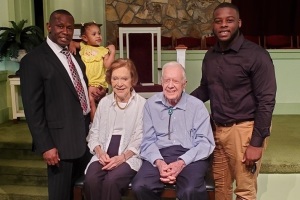Hearings with Roberts Reveal Judicial Philosophy, Few Specifics
Chief justice nominee John G. Roberts went through a second day of sometimes intense questioning by senators on Wednesday, as he explained more clearly his judicial philosophy, mostly without revealing how he would rule on individual cases.
Chief justice nominee John G. Roberts went through a second day of sometimes intense questioning by senators on Wednesday, as he explained more clearly his judicial philosophy, mostly without revealing how he would rule on individual cases.
The Wednesday interchange between Roberts and senators on the judiciary committee charged with the task of confirming him or not presented sometimes friendly, other times pointed and tense questions, as issues, including abortion and the “right to die” arose. The hearings also highlighted differences in Roberts’ judicial philosophy in contrast to that of some of the most conservative members of the current Supreme Court.
Throughout the hearings Roberts often explained that specific comments on some cases could undermine the fairness of future litigation before the court.
Jay Sekulow, chief counsel of the American Center for Law and Justice said that Roberts' refusal to comment was appropriate.
"Judge Roberts steadfastly refused to answer questions that would require him to prejudge issues that could well come before the Court. He drew a very clear and practical line—cases such as Marbury or Brown that are settled beyond a doubt can be discussed, but cases such as Roe that present emerging or developing issues are still very much in play. Despite intense questioning, for example, Judge John Roberts properly refused to provide any hints, predictions, or forecasts on how he might rule on privacy and abortion issues."
Roberts’ refusal to provide specific commentary on a "right to die" case rankled Sen. Joseph Biden (D-Del.), who felt that Roberts was not sufficiently forthcoming.
"Without any knowledge of your understanding of the law, because you will not share it with us, we are rolling the dice with you, Judge," Biden said, asking if "there is right to refuse extraordinary medical – heroic medical efforts that you don't want as an individual. And you are fully capable, mentally of making that decision."
Roberts replied that "that's asking me for an opinion in the abstract on a question that will come before the court. And when that question does come before the court, the litigants before me are entitled to have a justice deciding their case with an open mind based on the arguments presented, based on the precedents presented."
During Wednesday’s hearings, Roberts said he respected court precedent and distanced himself from aspects of the “original intent” philosophy embraced by the most conservative judges currently on the court. He also explained more about his approach to the right to privacy, but did not offer it in the context of the Roe v. Wade Supreme Court decision that legalized abortion.
"I depart from some views of original intent in the sense that ... some people view it as meaning just the conditions at that time, just the particular problem," Roberts said.
He felt the words of the constitution were intended “to apply in a meaningful way down the ages.”
Roberts answered questions about his judicial philosophy, including his views on the “originalist” view of the constitution. His comments on the matter served to distance him from some aspects of the philosophy, which takes into account the original views of the framers of the constitution.
Two of the most conservative justices on the court, Antonin Scalia and Clarence Thomas, adhere to originalist philosophy of interpreting the constitution.
Referring to the writers of the constitution, Roberts said, "I think you need to look at the words they use," "and if the words adopt a broader principle, it applies more broadly."
One analyst pointed out how this would serve to distinguish Roberts from Justices Scalia and Thomas. Charles Lane, a Washington Post Staff Writer said that Roberts' views were different based on their interpretations of the constitution.
"Scalia has previously said that courts should avoid basing their interpretations of laws on the history behind them; Roberts said there is a role for legislative history,” Lane stated.
During the hearings, Roberts expressed that precedent is an important consideration in deciding cases.
“Thomas has embraced an approach to constitutional interpretation that relies heavily on his view of the original intent of the framers; Roberts said that is not always possible," Lane added
With regard to the right of privacy, which is the basis for the legalization of abortion following the Roe v. Wade case, Lane also stated that Roberts’ views differed.
"Concretely, Roberts said he believes the Constitution creates a right to privacy. Such a right was recognized by the Supreme Court in modern cases protecting the use of contraception, abortion and consensual homosexual conduct, but which Scalia and Thomas have sharply criticized," Lane said.
Analysis by ACLJ’s Sekulow indicated that Roberts acknowledged the right to privacy between a married man and woman regarding contraception but stopped short of extending that right to Roe v. Wade.
"But, importantly, he refused to draw any connection between this privacy interest and Roe v. Wade, and stated explicitly that agreeing with the holding in Griswold is a very different matter than speaking to that case’s future ramifications," Sekulow said on the ACLJ web site.
In the Griswold v. Connecticut case, the Supreme Court struck down a Connecticut law that made it a criminal offense for a married couple to purchase contraceptives. In that case, the general right to privacy was determined to be one of the rights not specifically mentioned in the constitution.
In Tuesday's questioning Roberts said that the right to privacy existed, enumerating the various constitutional amendments that supported it, but did not mention the right in the context of abortion.




























